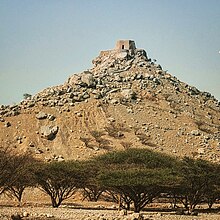General Maritime Treaty of 1820
They went on to destroy the fortifications and larger vessels of Umm Al Qawain, Ajman, Fasht, Sharjah, Abu Hail, and Dubai.
[4] The treaty was part of the UK's strategic policy of ensuring an open lines of communication between the British Raj and home islands, by excluding rival European powers from the Persian Gulf region, notably Russia and France.
Ajman, Umm Al Qawain and Sharjah all came under one preliminary agreement signed with Sheikh Sultan bin Saqr, while others were undertaken with the Rulers of Dubai, Abu Dhabi, and Khatt and Falayah.
The treaty also makes provision for the exchange of envoys, for the "friendly Arabs" to act in concert against outside forces and to desist from putting people to death after they have given up their arms or to carry them off as slaves.
As seen above, the treaty bears some quaint spellings of the names of the signatories ('Abdoola bin Rashid'), the dates ('the month of Rubee-oos-Sanee') and the territories ('Aboo Dhebbee', Shargah, Ejman and Umm ool Keiweyn').
In Bombay's opinion, the treaty should have forbade the building of coastal fortifications, restricted shipbuilding and stipulated powers of search and confiscation as well as empowering British forces to destroy any construction undertaken in the face of the prohibition.
Grant's response was spirited, pointing out that to have enforced extreme measures would have meant pursuing the chiefs into the interior rather than accepting their voluntary submission.
[7] The treaty, or perhaps more accurately the memory of the punitive actions that had preceded its signing, virtually eliminated piracy on the coast as a profession and, although there were occasional incidents, the level of maritime conflict – particularly against foreign vessels – dropped dramatically.
The Government in Bombay continued to press for more stringent measures against the coastal Sheikhs, including an incident in 1823 when a tower erected in Ras Al Khaimah was forcibly demolished.
With the garrison in Ras Al Khaimah withdrawing to Qishm and then giving way to a policy of maritime patrol and the establishment of a native Political Agent in Sharjah in 1823, British actions were reduced to occasional visits to enforce the rule of law along the coast.
[12] A further engagement for the suppression of the slave trade was signed in 1856 and then in 1864, the 'Additional Article to the Maritime Truce Providing for the Protection of the Telegraph Line and Stations, Dated 1864'.


